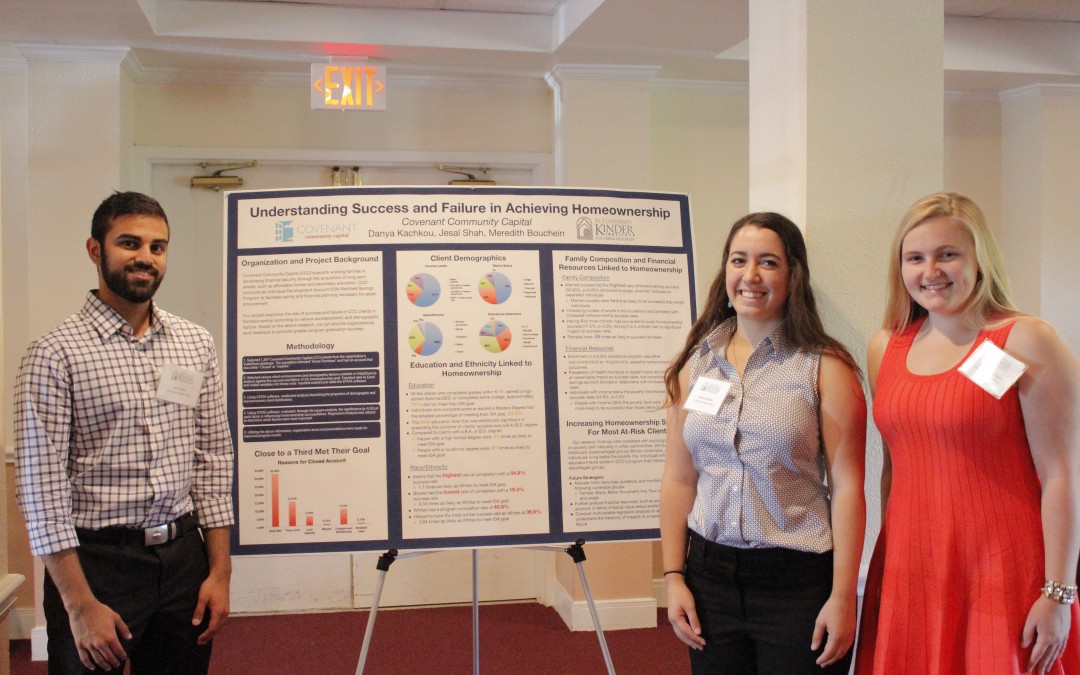Jesal Shah | Class of ’15 | May 7, 2015
Unlike any course I’ve taken, the service component of the Community Bridges fellowship provided an experiential means to grasp the social processes involved in poverty and financial insecurity. Although not immediately tied to health – the focus of my career interests – this work has greatly benefited my understanding of the connection between socioeconomics and health. I would even argue that the initial distance between the organization’s goals and my own interests was a big part of why this experience was so beneficial to me, and the organization.
For the past semester, I have worked for Covenant Community Capital (CCC), an organization that addresses intergenerational poverty through asset development and financial management. CCC’s Individual Development Account Matched Savings Program, or just Savings Program for short, helps individuals and families save money to buy a house.
As a student studying biochemistry and policy studies, I did not have the relevant financial knowledge or skills to be considered a natural fit for this organization. However, that’s part of what inspired me to pursue this opportunity. The success of this program offered a great opening for me to understand how to promote homeownership and through this, grasp the role of wealth in one’s life.
Since 1998, CCC has graduated over 400 families through their Savings Program, spanning more than 250 successful home closures and zero foreclosures. It is truly remarkable how the organization navigates its large demands and meets its goals.
Nonetheless, this heavy workload has also prevented CCC from taking some peripheral, but potentially necessary, supplementary actions to improve its operation. One of those steps includes evaluating the program.
That’s where we, the interns, come in.
Along with two other Community Bridges fellows – Danya Kachkou and Meredith Bouchein, we came across a vast database that includes client socioeconomic/demographic data as well as their program outcomes. Despite being a veritable gold mine of information, these data had not been previously analyzed.
Ideally, of course, the group working on this project would have possessed the appropriate skill set from the beginning. But that’s not what CCC had in us. They had interns who were unfamiliar with the database and had only a rudimentary knowledge of statistics. Fortunately, they also had interns with a passion for the organization goals and the will to help address obvious needs.
As we learned, these characteristics turned out to be more important for completing this process than any initial skills that we came in with.
It was only through perseverance and by utilizing available resources (including mentors at Rice University and CCC) that we were able to provide CCC with the necessary information regarding client success. This information – including the likelihood of completing the program across various factors, such as education, race/ethnicity, financial resources and family composition – will be used to better target CCC’s efforts when offering clients guidance and monitoring.
Our situation may have been somewhat unique given Mr. Fairfield’s (the founder and CEO of CCC) strong belief in the value of individuals with unique interests and skills, and their ability to contribute to the organization’s overall mission of tackling intergenerational poverty. But even in other contexts without a Mr. Fairfield, this seems to be a valuable lesson to learn and share:
Each of us can serve our community through our own personal skill sets, regardless of what that skill set includes.
In fact, this lack of standardization in volunteer matching can encourage originality and novel approaches.
The simple desire to take action is the perfect impetus for the learning and development required for success in service-based volunteering. While a future doctor does not seem like the prototypical intern for personal finance efforts, most service opportunities, like this one, look beyond credentials and skills to what really matters – heart.

